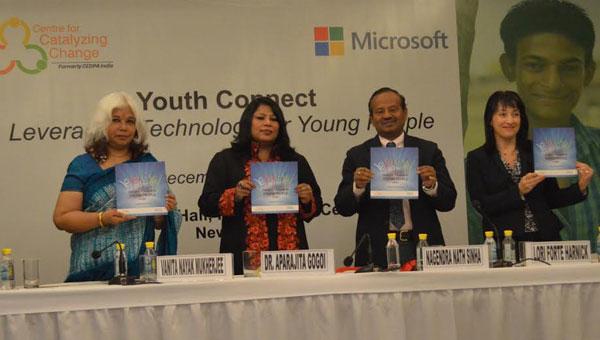 NIL
NIL
NGO launches IVRS for SABLA services in Delhi, Jharkhand
New Delhi, Dec 10 (IBNS): The Centre for Catalyzing Change (formerly CEDPA India), a leading NGO working for women and girl empowerment, on Wednesday organized a national learning conference, Youth Connect-Leveraging Technology for Young People, to showcase innovations around leveraging of new technologies for developing skills of young people.
The conference witnessed the launch of Interactive Voice Response System (IVRS) for the Scheme for Empowerment of Adolescent Girls (SABLA) services in Delhi and Jharkhand and the release of a Good Practices Compendium by Nagendra Nath Sinha, IAS, Principal Secretary, Department of Information Technology, Government of Jharkhand.
In an effort to showcase innovations using technology to skill, inform and empower young people, Centre for Catalysing Change joined hands with Microsoft to organize the conference.
The platform brought together non-governmental organizations (NGOs), social-tech companies, innovation firms and representatives from Central and state government departments to dialogue on new and niche technologies available for reaching out to young people, and featured diverse innovations.
Leveraging Technology for Young People in India – a Compendium of Good Practices was released on the occasion that captures successful case studies of innovations that have leveraged technology to address relevant issues and empower young people.
The launch of IVRS for SABLA services in Delhi and Jharkhand would empower millions of adolescent girls with information on aspects of health, hygiene, nutrition, adolescent reproductive and sexual health (ARSH) and family and child care, so as to improve their nutrition and health status and enable their self-development and empowerment.
In order to avail the services, the beneficiaries can give a missed call on 9250500444 for Delhi and 9250500111 for Jharkhand.
Speaking on the sidelines of the conference, Aparajita Gogoi, Executive Director, Centre for Catalyzing Change, said, “Youth Connect is a first of its kind innovation conference that has brought together diverse stakeholders to showcase and dialogue on technology innovations that have made a difference in the lives of millions of youth across the country. A vast youth population is both an opportunity and a challenge, call for using technology to find solutions and build capacities."
"It requires solutions that function effectively at scale. The aim of the conference was to feature such innovations developed by bright young minds that have made a difference at scale and demonstrate immense potential. The launch of the IVRS for SABLA services was a step in that direction. The release of the Good Practices Compendium, we hope would inspire and guide many people to work on youth and social issues through such innovative approaches," Gogoi said..jpg)
.jpg)
Lori Forte Harnick, General Manager, Citizenship and Public Affairs, Microsoft, the keynote speaker on this occasion, reiterated Microsoft’s commitment to a digitally inclusive society.
She said, “Youth in India today are keen on improving their education and acquiring skills necessary to access better jobs and better futures but access to technology which is key to reaching their goals is not uniform despite India’s tremendous progress as a country on this front. Education and skill development are powerful catalysts and the right focus on these can further augment India’s growth story.”
The adoption of technology in everyday life and particularly by the youth has seen an enormous increase in the last decade. From accessing educational content and acquiring skills to sharing information and performing everyday mundane tasks, technology is driving disruption at a rapid pace. However, equitable access to technology for education and skill development is still a challenge and largely unavailable in many parts of the country.
The Youth Connect conference featured diverse innovations which have successfully leveraged technology solutions to overcome the challenges and improve accessibility.
They range from Youth Ki Awaaz, an initiative that has revolutionized social media platforms to raise issues of young people, to Quest Alliance that has relentlessly worked to enhance the quality and relevance of education and training for young people, to B2R that has taken rural business-process management to villages in Uttarakhand, and last but not the least, Feminist Approach to Technology (FAT) that works to break societal stereotypes that prevent women from learning and using technology.
Top Headlines
-
News
Ali Khamenei (19392026): Irans Supreme Leader who ruled with an iron grip
March 01, 2026
-
News
Ali Khamenei (19392026): Irans Supreme Leader who ruled with an iron grip
March 01, 2026
-
News
Ayatollah Ali Khamenei killed in US-Israeli Air Strikes; Irans Revolutionary Guards vow sweeping retaliation
March 01, 2026
-
News
PM Modi expresses displeasure over NCERT judiciary chapter, wants accountability fixed
February 26, 2026
-
News
Former New Zealand PM Jacinda Ardern to relocate to Australia amid growing Kiwi exodus
February 26, 2026
-
News
Major aviation boost for Kashmir: Cabinet clears development of a new Civil Enclave at Srinagar International Airport
February 24, 2026
-
News
India urges all nationals to leave Iran 'by available means' as US-Iran tension grows
February 23, 2026
-
News
Ind.AI: Sovereignty, jobs, energy and the What If?
February 20, 2026
-
News
From car diplomacy to global strategy: Modi, Macron upgrade IndiaFrance ties
February 17, 2026
-
News
Seva Teerth: PM Modi inaugurates new PMO, announces these key decisions on first day
February 13, 2026





